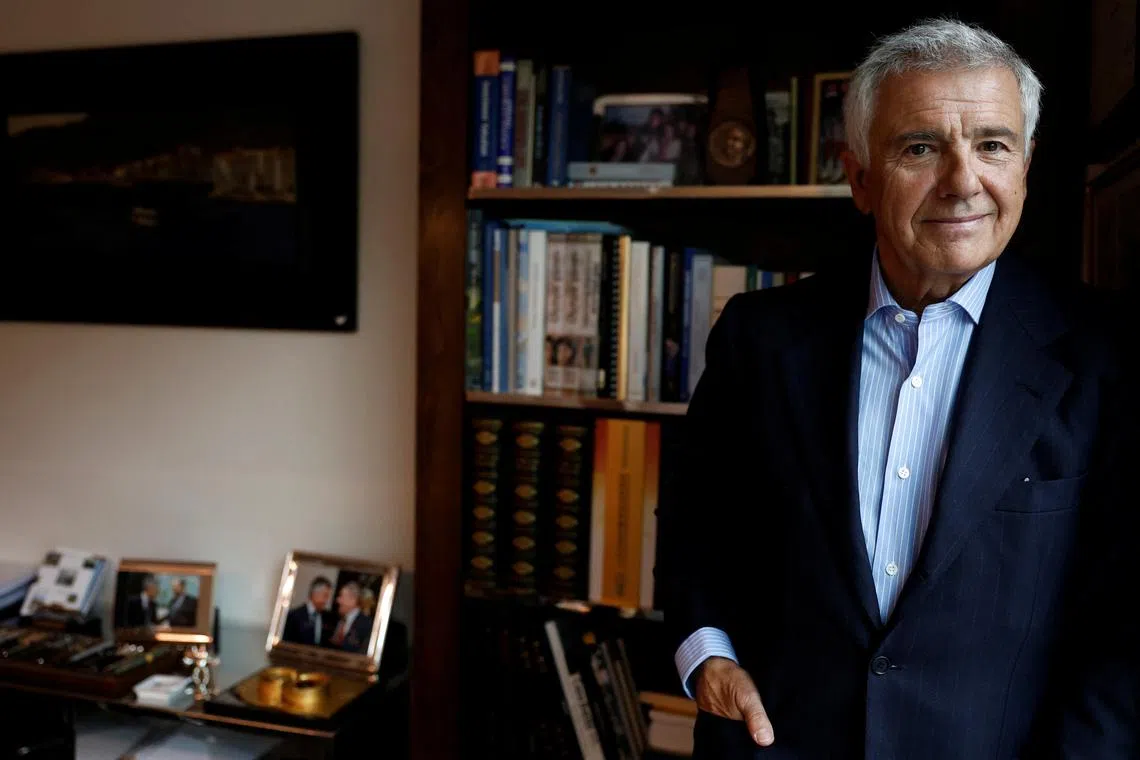IOC hopeful Juan Antonio Samaranch Jr proposes Olympics in winter for extreme heat nations
Sign up now: Get the biggest sports news in your inbox

Juan Antonio Samaranch Jr is the son of former IOC president Juan Antonio Samaranch.
PHOTO: REUTERS
MADRID – Juan Antonio Samaranch Jr, a contender in the race to become the next president of the International Olympic Committee (IOC), has outlined his vision for the organisation, emphasising that the IOC should remain neutral in political matters.
Samaranch said it was not the IOC’s job to take sides in such issues.
“We cannot, unfortunately, generate peace. We cannot, unfortunately, make the wars stop. But we have, as our main goal, to demonstrate to the world that another way is possible,” Samaranch told Reuters in an interview on Sept 25.
“That means we cannot take sides and we have to maintain the unity of the movement in not taking sides in all the raging conflicts in the world.
“If we start taking part as an organisation, saying ‘this country’s human rights record I don’t like’ or ‘this other country is guilty in this war’, we will disappear and the Olympic Games will disappear with the good that it does.”
In a nod to the evolving global climate, Samaranch suggested that future Olympic Games could be held during the winter months, similar to how the 2022 football World Cup was hosted in Qatar.
This, the 64-year-old said, would allow countries with extreme summer temperatures to participate without the challenges posed by heat.
“If we are truly an universal organisation and we better be, otherwise we would be extinct, we have to make sure that we make the Games available to everybody in the world, all regions in the world,” he said.
“It is not acceptable that we say because of history or tradition that we are gonna exclude regions of the world from the possibility of organising the Olympic Games.
“It is not them that will have to change their climate, it will be us that will have to change whatever is necessary to be truly universal.”
Samaranch, the son of former IOC president Juan Antonio Samaranch, addressed questions about his father’s legacy, asserting that he has never relied on his family name to advance his career.
“(Being my father’s son) is not an advantage,” said the Spaniard. “I’ve never used his influence during the 23 years of my membership in the IOC and certainly will not for the six months to come, I have never planned to make that play a role or be an advantage. I would never use it, but I don’t think it ever helped.”
While recognising the growing importance of technology and advocating the inclusion of urban and e-sports to the Olympic movement, Samaranch underscored that experience remains the key qualification for leading the IOC.
“I am a candidate because I think I have a lot to offer to the Olympic movement and the IOC that today are a very extraordinarily complex and important machine,” he said.
“It’s a very complex job that requires a lot of experience. A lot of criteria. You need to have been there many years. And I’ve reached a moment in my life, in an age that I have, I can dedicate my time to the Olympic movement.”
The election will be at the IOC session in Athens, which runs from March 18-21, 2025.
Samaranch is among seven candidates who have declared their bid to succeed Thomas Bach, 70, who is standing down after 12 years. The other candidates are World Athletics chief Sebastian Coe, Zimbabwean politician and former swimmer Kirsty Coventry, world cycling boss David Lappartient, International Ski Federation president Johan Eliasch, Jordan’s Prince Feisal Al-Hussein and International Gymnastics Federation president Morinari Watanabe.
Meanwhile, Toyota Motor chairman Akio Toyoda said on Sept 26 that the company will end its contract as a top sponsor for the Olympics and Paralympics following the end of the Paris Games.
Toyota had a contract valued at US$835 million (S$1.07 billion) – reported to be the IOC’s largest sponsorship deal when it was announced in 2015.
The company will continue to support athletes, Toyoda said during an interview in the company-owned media channel.
Earlier in September, Panasonic Holdings announced it would end its 37-year run as a top Olympic sponsor at the end of the year.
REUTERS


